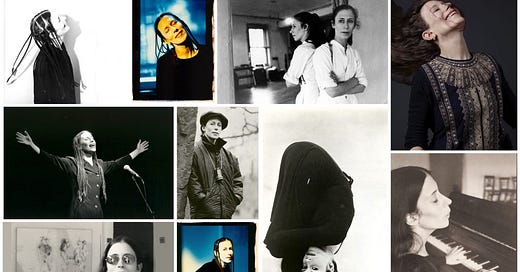Listening to Atlas
(Collage of Meredith Monk images from her website.)
This morning I am listening to Atlas, the mostly wordless opera by Meredith Monk. Though wordless, but it has a plot. The plot is that teenage Alexandria lives in the great American suburbs. She has a vision of travel, selects a diverse group of traveling companions, goes on an adventure, acquires more companions, sees the world, travel beyond the world, has a revelation and returns home, enlightened, finding “what she was looking for in the simple acts and tendernesses of the moment. What has seemed to have been the depiction of an expedition has become the inner journey of a soul.” It strikes me as a little woo-woo, but a very young me would be entranced by this story. It is similar to one of my favorite books from childhood, Happy Birthday To You! by Dr. Seuss. The idea of a journey of revelation and knowledge is still appealing 50 years later.
Listening to Meredith Monk was part of my personal journey to hear what composers are doing right now. Ever since I heard Philip Glass for the first time, I’ve been fascinated to discover what it meant to be a composer right now, in an age of popular recorded music, in an age of “furniture music,” as Erik Satie called it.
Now the weird thing about Monk is that I can’t figure out where to slot her into the world of contemporary music. She’s not exactly a minimalist like Glass or Steve Reich or John Adams or Max Richter, nor is she a creator of soundscapes like, say, Anna S. Þorvaldsdóttir and others in what I think of the Icelandic school. This is all fine, except for one stupid thing that I am a little embarrassed to admit. Part of my confusion about Monk is that I don’t have a grasp on what her reputation is.
If I were completely confident in my tastes, Monk’s reputation would be irrelevant, of course. But I always seek validation. I want to know, does critical establishment esteem her? Alex Ross mentions her in passing in his excellent book The Rest Is Noise as an exemplar of the late 70s loft scene in New York, so that helps my confidence a tad. Nonetheless, without a lot of critical support for my opinion, I have decided I like Atlas. The fact that this is hard to admit shows just how insecure I am about taste. I want to put Monk into a particular pigeonhole to help me make sense of her music.
The opera premiered in Houston in 1991. The Houston Grand Opera has a history of premiering contemporary operas. They were the first to stage Nixon in China by John Adams and Alice Goodman in 1987 and The Making of the Representative for Planet 8 by Philip Glass and Doris Lessing in 1988 (During its run, I heard Doris Lessing speak and got Glass’s autograph at a showing of Powaqqatsi that was held at the same time. But I never saw the opera). I don’t know if HGO’s practice of commissioning and premiering operas is unusual or if you’d find similar practices all over the world or opera.
Atlas will never become part of the standard repertoire. The music is approachable, but the vocals are just too weird and the drama too abstract to appeal to fans of Carmen or Rigoletto. But it is part of my personal repertoire.
You can listen to the whole thing on YouTube.
[Please consider supporting my work by becoming a patron.]




